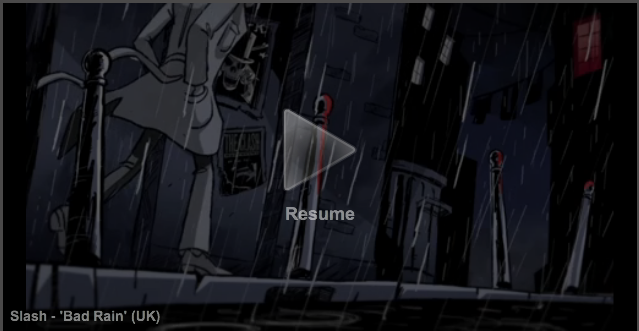If I were to ask you to name your top ten favourite movies of all time, how long would it take you to settle on a list? Would you find it as easy as 1,2,3, able even to put them in order of preference all the way up to 3,2,1? Or would it take hours of head-scratching, soul-searching and discussion, with DVDs and old videos being pulled out and watched over to remind yourself of how great or maybe not so great a film is? I was asked this recently and I must admit that I found the idea of naming my top ten favourite films absolutely impossible. I can name the titles of numerous films that would most certainly be included in the list but I couldn’t for a single moment begin to arrange them in any order of preference. Nor could I stop at ten. I’m guessing, but I think the number would be at least twice that and likely many more. For me, there are quite simply more than ten films worthy – for reasons aesthetic, technical, artistic or simply just plain entertaining – of standing on the shoulders of all the rest. Of course, if you want to see such a list the Internet has dozens of them. Dozens of top tens, top fifties and top one hundreds compiled by movie fans, critics and institutes alike, all with most probably a far greater knowledge of cinema than do I.
However, the idea of compiling a top ten list of something appealed to the pop-picker in me and so I continued to think of one that would be related somehow yet easier, nay possible to come up with. What I decided on came to me via my iPod and although it initially seemed fairly straightforward, as I scrolled through my music library and then began researching certain items that were on my wish list, so began the head-scratching, the soul-searching and the discussion. Nevertheless, finally after what I consider too long a time, I have compiled a list of my ten favourite film music composers. But please don’t think there’s any order of preference here.
I will kick off with the only one on my list that I happened to have shared a ceiling with because ten years ago, I was fortunate enough to see Elmer Bernstein perform at the Royal Albert Hall in London. Needless to say, it was a fabulous evening and I think I whistled The Great Escape tune all the way back home, probably to the annoyance of my fellow tube travellers. Bernstein (not to be confused with Leonard) is probably best known for his scores for The Great Escape and The Magnificent Seven, the latter of which undoubtably helped turn a fairly routine western into one of the most enjoyable films of the genre. His upbeat western themes, of which there are many, are a true joy but a quick look at his credits prove him to be an extremely versatile composer, capable of writing for any genre. He won an Oscar for Thoroughly Modern Millie (1967) and would go on to be nominated a total of 14 times giving us along the way great scores like The Man with the Golden Arm, To Kill a Mockingbird and The Age of Innocence.
Last year (2012), Hitchcock’s Vertigo replaced Citizen Kane at the top of the British Film Institute’s Greatest Films of All Time list. That’s somewhat significant when you consider that Orson Welles’ debut film had previously occupied the top spot for 50 years. What’s also of interest is that Bernard Hermann wrote the score for both movies. Hermann, who started off working in radio as a staff conductor, wrote some incredibly atmospheric pieces – The Ghost and Mrs. Muir and The Day the Earth Stood Still are about as atmospheric as you can get. He collaborated on many a Hitchcock picture and gave us the classic dramatic soundtracks to North by Northwest and Psycho. But there was much much more great music throughout his career too. Mysterious Island, Cape Fear and On Dangerous Ground to name but three. He won an Oscar for The Devil and Daniel Webster in 1941and would go on to receive a total of 5 nominations.
Next up on my list of no particular order comes one of the most successful and influential film composers of all time, a man who, aside from Walt Disney, is unmatched in Academy Award nominations with a total of forty eight to date. Out of these he has garnered five wins. He has composed some of the most recognisable and whistleable music in film history including Star Wars, Superman and the Indiana Jones films. I refer, of course, to John Williams. Williams moved to Los Angeles and began writing film scores in the late ’50s but it wasn’t until he penned the music to Spielberg’s Jaws in 1974 that his career really took off. The ominous three-note motif that he composed was a stroke of genius and has since become synonymous with sharks. Many of his compositions employ a full orchestra and this gives his music a classical neoromantic style, making it very easy to pop in a CD and listen to. His grand symphonic score to Star Wars has become the highest grossing non-popular music recording of all time. His score for Jurassic Park is sublime as are those for Saving Private Ryan, Empire of the Sun and the Harry Potter films. His most recent work for Spielberg’s Lincoln shows that even after fifty years of composing film scores, he’s still got what it takes to give the world beautiful music.
Another John now, this time John Barry. Barry will probably be remembered as the man who gave musical accompaniment to the world’s coolest spy. Although the writing credit for the James Bond theme goes to Monty Norman, it was Barry’s arrangement that has made it one of the most instantly recognisable pieces of music the world has ever heard. He wrote the scores for eleven more 007 films throughout the ’60s, ’70s and ’80s and for my money, the Bond music was never better. On Her Majesty’s Secret Service is, in my opinion, the high point of the series but all those that came before it have terrific soundtracks. He scored numerous other films throughout a fifty year career and picked up five Oscars (Born Free (best score and song), The Lion in Winter, Out of Africa and Dances with Wolves) out of seven nominations along the way. Zulu, The Ipcress File, Midnight Cowboy and Enigma are great examples of his film soundtracks. Early in his career, he had a number of hit singles with his band The John Barry Seven – Hit and Miss, Walk Don’t Run and Beat for Beatniks to name just three – and these tunes simply ooze with the style and coolness that was inherent on the streets and in the clubs of London in those swinging ’60s. He also penned some memorable TV themes, none more so than The Persuaders!
Ennio Morricone, like the preceding four composers here, has a certain style. And this style is no more apparent than in his scores for the spaghetti westerns for which he is most famous. In 1964 director Sergio Leone set out to make a different kind of western and when he hired Morricone to write the score, they created an accompanying soundtrack that was equally different from the orchestral standards of the genre that had come before. Making use of the then new Fender electric guitar, jew’s harps and trumpets they basically came up with a whole new twangy sound for a western movie soundtrack. And what a sound it was. As instantly recognisable after just a few bars as the James Bond theme and equally as evocative. His music adds another dimension to these films and is arguably a character of its own. Without their soundtracks, these films simply would not be the same. And like Elmer Bernstein, Morricone’s versatility ensured that he wasn’t restricted to just cowboy films. His long list of credits include, the comedies La Cage aux Folles and Bulworth, John Carpenter’s excellent 1982 chiller flick The Thing, the Schwarzenegger fantasy movie Red Sonja, The Untouchables starring Kevin Costner and Robert De Niro and Clint Eastwood’s In the Line of Fire. Aside from the spaghetti westerns, perhaps his best known work is the soundtrack for The Mission, a 1986 film by Roland Joffé about the experiences of a Jesuit missionary in South America during the 18th Century. It is considered to be a perfect example of what music can do for a film and has sold over 3 million copies worldwide. Surprisingly, Morricone has never won an Academy Award but he has been nominated a total of five times.
Another composer who enjoyed a long and successful career was Jerry Goldsmith. Goldsmith began scoring radio shows in the early 1950s and this quickly progressed to television shows such as The Twilight Zone and later, the theme to The Man from U.N.C.L.E. His first feature film was a western in 1957 called Black Patch. More TV and film scores followed but it wasn’t until he scored the classic 1962 western Lonely Are the Brave that he began to receive widespread recognition. Throughout the decade his career flourished with critically acclaimed achievements like A Patch of Blue and The Sand Pebbles both of which garnered him Oscar nominations. Another nomination together with enormous critical attention came for his controversial soundtrack to The Planet of the Apes in ’68, a score which saw him using innovative techniques to get the ape-like sounds he wanted. The Omen in ’76 saw him win his only Oscar out of a total of 18 nominations and before his death in 2004, he would go on to give us some of the most stirring and memorable film music ever. Star Trek: The Motion Picture is perhaps his most recognised work and following its success, he would go on to score four more films for the franchise (my personal favourite score being First Contact) as well as the themes to the TV series The Next Generation and Voyager. Other highlights include the wonderfully eerie Alien, the spooky Poltergeist and the cool jazzy L.A. Confidential.
Long considered to be one of the giants of Hollywood movie music, Dimitri Tiomkin was musically trained in Russia and made his performing debut in the early ’20s as a pianist playing with the Berlin Philharmonic. He moved to Hollywood in 1929 but it wasn’t until ’37 that his score for Frank Capra’s Lost Horizon helped him achieve any sort of recognition. The next ten years saw him work with Capra on films including Mr Smith Goes to Washington and It’s a Wonderful Life. Over the course of his career, he wrote music for some of the most popular and spectacular films ever including The Guns of Navarone, The Alamo, The Fall of the Roman Empire and Land of the Pharaohs. He scored four Hitchcock films including Strangers on a Train and Dial M for Murder and numerous westerns, the genre with which he perhaps became most associated. His first was Duel in the Sun in 1946 and his most well-known was High Noon 1952, a film which received seven Oscar nominations and won four, two of which were for Tiomkin – Best Original Music and Best Song. This was the first time a composer had received two awards for the same movie. He won twice more for The High and the Mighty in ’54 and The Old Man and the Sea in ’58. In total he would be nominated twenty two times. Other highlights include Gunfight at the O.K. Corral, The War Wagon, Town Without Pity and Giant. Tiomkin also penned memorable themes to TV shows such as Rawhide and Gunslinger.
In complete contrast to the classic style of Tiomkin comes Lalo Schifrin, an Argentine pianist at heart with jazz running through his veins. He is perhaps best known for his theme to the Mission: Impossible TV show and several of Clint Eastwood’s Dirty Harry movies. These are excellent examples of his often edgy, frequently pumping and sometimes cool jazzy soundtracks but there are so many more scores worth attention. Schifrin moved to Hollywood in 1963 and was offered his first film project by MGM in the form of an African adventure called Rhino! That year he re-arranged Jerry Goldsmith’s original theme to The Man from U.N.C.L.E. into something far more jazzy and ended up winning the 1965 Emmy award for Best TV Theme. His credits encompass virtually every genre and include some of the coolest tunes associated with film. Notable soundtracks are Cool Hand Luke, Bullitt, Enter The Dragon and Rush Hour. Classic TV themes penned by him include Starsky and Hutch and Planet of the Apes. He’s yet to win an Oscar but he’s been nominated six times to date.
Another composer who knew how to write “cool” was Henry Mancini. Some of his best known works include The Pink Panther theme, Moon River and Breakfast at Tiffany’s and the score to Victor Victoria. His career as a musician began in 1946 when he became a pianist and arranger for the newly re-formed Glenn Miller Orchestra. Six years later he joined Universal Pictures music department where he contributed to dozens of films including The Glenn Miller Story starring James Stewart. This gave him his first Oscar nomination. In ’58 his thirty-five year collaboration with Blake Edwards began when he scored the TV series Peter Gunn. Breakfast at Tiffany’s followed as did The Pink Panther and it’s sequels, The Great Race and Victor Victoria to name just a few of their pairings. He worked with numerous Hollywood directors throughout his career and along the way gave us such scores as those for Hatari! which includes the chirpy and well-known Baby Elephant Walk, The Molly Maguires, Charade, The Glass Menagerie and Santa Claus: The Movie. In Oscar terms he was nominated eighteen times and won four.
One of the first composers to ever write musical scores for movies was Max Steiner, an Austrian-born music prodigy who was trained by Johannes Brahms and Robert Fuchs. He conducted his first operetta at age twelve and became a full-time professional conductor/composer at fifteen. Steiner is referred to as “the father of film music” and is widely considered one of the greatest film score composers in the history of cinema. He composed over three hundred scores for RKO and Warner Brothers throughout his career and was nominated for an Oscar twenty four times, winning three for The Informer (1935), Now, Voyager (1942), and Since You Went Away (1944). Besides these, his more popular scores include King Kong (1933), Casablanca (1942) and his most famous work and arguably the greatest film score ever recorded Gone with the Wind (1939). From Austria, the young Steiner toured to England, then to New York for a fifteen year stint on Broadway as musical director or conductor before accepting an offer from RKO to move to Hollywood. His first screen credit as orchestrator came on a musical called Dixiana in 1930. His breakthrough came three years later with King Kong. Actor and musician Oscar Levant later called the film “a symphony accompanied by a movie”. After a move from RKO to Warner Bros. Steiner was sought after by the leading directors of the day. Other notable scores include The Searchers, They Died with Their Boots On, The Big Sleep and The Treasure of the Sierra Madre.
Marvin Hamlisch wasn’t the first composer to take the musical reigns of the 007 franchise from John Barry. George Martin was that man. George ‘The Fifth Beatle’ Martin composed the score and the title song for Live and Let Die and while the latter is arguably one of the best of the series, the former is not quite up to the standard set by Barry. Marvin Hamlisch contribution to the franchise was The Spy Who Loved Me and again one can argue that the title song he co-wrote with Carole Bayer Sager – Nobody Does It Better – is a strong entry in the series but the rest of the soundtrack is below Barry’s high standard. Having said that, it’s by no means the weakest in the franchise’s history. Hamlisch’s first job was as a rehearsal pianist for Barbra Streisand’s Funny Girl. His first film score was for the 1968 Burt Lancaster movie The Swimmer. He followed this with a number of comedies including two Woody Allen films but it wasn’t until 1973 that things got interesting for him. That was the year he wrote the title song and score for The Way We Were as well as adapting Scott Joplin’s ragtime music for the movie The Sting and he would walk away from the Dorothy Chandler Pavilion on the following Oscar night with three gold statuettes in his grip. The Way We Were is beautiful romantic music and The Sting is a fun collection of Joplin’s classic rags sewn together and embellished by Hamlisch’s wonderful orchestrations. He would go on to receive a total of twelve Oscar nominations with three wins. Other fine works include Sophie’s Choice, A Chorus Line and The Informant! a 2009 Matt Damon film directed by Steven Soderbergh.
And now, I hesitate to continue because, as those of you who are still awake will have observed, I have already surpassed my allowance for this list of my ten favourite composers. And yet I still have more to share, more names that should be in that top ten. You see how awful I am at these lists! Oh well, maybe next time I’ll share with you my thoughts on Maurice Jarre’s exquisite scores to Lawrence of Arabia, Doctor Zhivago and A Passage to India all of which he won an Oscar for, and Ron Goodwin’s excellent wartime music for Where Eagles Dare, 633 Squadron and Battle of Britain as well as Yann Tiersen’s gorgeous score to Amélie. But until then, if you get a chance, pop in a soundtrack CD and listen to the music that our film composers have written. Sit back and enjoy their hard work unaccompanied by the sights and sound effects of a movie and allow yourself the pleasure to hear their talent in all its pure, undiluted form.




